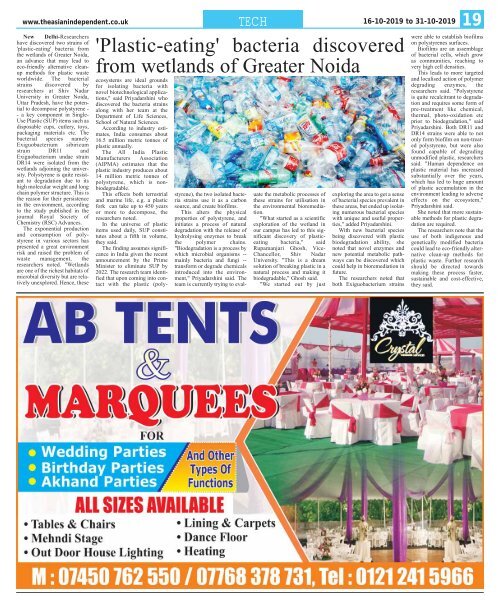Revised the Asian Independent 16 oct to 31 oct 2019
You also want an ePaper? Increase the reach of your titles
YUMPU automatically turns print PDFs into web optimized ePapers that Google loves.
www.<strong>the</strong>asianindependent.co.uk<br />
New Delhi-Researchers<br />
have discovered two strains of<br />
'plastic-eating' bacteria from<br />
<strong>the</strong> wetlands of Greater Noida,<br />
an advance that may lead <strong>to</strong><br />
eco-friendly alternative cleanup<br />
methods for plastic waste<br />
worldwide. The bacterial<br />
strains discovered by<br />
researchers at Shiv Nadar<br />
University in Greater Noida,<br />
Uttar Pradesh, have <strong>the</strong> potential<br />
<strong>to</strong> decompose polystyrene -<br />
- a key component in Single-<br />
Use Plastic (SUP) items such as<br />
disposable cups, cutlery, <strong>to</strong>ys,<br />
packaging materials etc. The<br />
bacterial species namely<br />
Exiguobacterium sibiricum<br />
strain DR11 and<br />
Exiguobacterium undae strain<br />
DR14 were isolated from <strong>the</strong><br />
wetlands adjoining <strong>the</strong> university.<br />
Polystyrene is quite resistant<br />
<strong>to</strong> degradation due <strong>to</strong> its<br />
high molecular weight and long<br />
chain polymer structure. This is<br />
<strong>the</strong> reason for <strong>the</strong>ir persistence<br />
in <strong>the</strong> environment, according<br />
<strong>to</strong> <strong>the</strong> study published in <strong>the</strong><br />
journal Royal Society of<br />
Chemistry (RSC) Advances.<br />
The exponential production<br />
and consumption of polystyrene<br />
in various sec<strong>to</strong>rs has<br />
presented a great environment<br />
risk and raised <strong>the</strong> problem of<br />
waste management, <strong>the</strong><br />
researchers noted. "Wetlands<br />
are one of <strong>the</strong> richest habitats of<br />
microbial diversity but are relatively<br />
unexplored. Hence, <strong>the</strong>se<br />
TECH<br />
'Plastic-eating' bacteria discovered<br />
from wetlands of Greater Noida<br />
ecosystems are ideal grounds<br />
for isolating bacteria with<br />
novel biotechnological applications,"<br />
said Priyadarshini who<br />
discovered <strong>the</strong> bacteria strains<br />
along with her team at <strong>the</strong><br />
Department of Life Sciences,<br />
School of Natural Sciences.<br />
According <strong>to</strong> industry estimates,<br />
India consumes about<br />
<strong>16</strong>.5 million metric <strong>to</strong>nnes of<br />
plastic annually.<br />
The All India Plastic<br />
Manufacturers Association<br />
(AIPMA) estimates that <strong>the</strong><br />
plastic industry produces about<br />
14 million metric <strong>to</strong>nnes of<br />
polystyrene, which is nonbiodegradable.<br />
This effects both terrestrial<br />
and marine life, e.g. a plastic<br />
fork can take up <strong>to</strong> 450 years<br />
or more <strong>to</strong> decompose, <strong>the</strong><br />
researchers noted.<br />
In <strong>the</strong> universe of plastic<br />
items used daily, SUP constitutes<br />
about a fifth in volume,<br />
<strong>the</strong>y said.<br />
The finding assumes significance<br />
in India given <strong>the</strong> recent<br />
announcement by <strong>the</strong> Prime<br />
Minister <strong>to</strong> eliminate SUP by<br />
2022. The research team identified<br />
that upon coming in<strong>to</strong> contact<br />
with <strong>the</strong> plastic (polystyrene),<br />
<strong>the</strong> two isolated bacteria<br />
strains use it as a carbon<br />
source, and create biofilms.<br />
This alters <strong>the</strong> physical<br />
properties of polystyrene, and<br />
initiates a process of natural<br />
degradation with <strong>the</strong> release of<br />
hydrolysing enzymes <strong>to</strong> break<br />
<strong>the</strong> polymer chains.<br />
"Biodegradation is a process by<br />
which microbial organisms --<br />
mainly bacteria and fungi --<br />
transform or degrade chemicals<br />
introduced in<strong>to</strong> <strong>the</strong> environment,"<br />
Priyadarshini said. The<br />
team is currently trying <strong>to</strong> evaluate<br />
<strong>the</strong> metabolic processes of<br />
<strong>the</strong>se strains for utilisation in<br />
<strong>the</strong> environmental bioremediation.<br />
"What started as a scientific<br />
exploration of <strong>the</strong> wetland in<br />
our campus has led <strong>to</strong> this significant<br />
discovery of plasticeating<br />
bacteria," said<br />
Rupamanjari Ghosh, Vice-<br />
Chancellor, Shiv Nadar<br />
University. "This is a dream<br />
solution of breaking plastic in a<br />
natural process and making it<br />
biodegradable," Ghosh said.<br />
"We started out by just<br />
<strong>16</strong>-10-<strong>2019</strong> <strong>to</strong> <strong>31</strong>-10-<strong>2019</strong><br />
exploring <strong>the</strong> area <strong>to</strong> get a sense<br />
of bacterial species prevalent in<br />
<strong>the</strong>se areas, but ended up isolating<br />
numerous bacterial species<br />
with unique and useful properties,"<br />
added Priyadarshini.<br />
With new bacterial species<br />
being discovered with plastic<br />
biodegradation ability, she<br />
noted that novel enzymes and<br />
new potential metabolic pathways<br />
can be discovered which<br />
could help in bioremediation in<br />
future.<br />
The researchers noted that<br />
both Exiguobacterium strains<br />
19<br />
were able <strong>to</strong> establish biofilms<br />
on polystyrenes surfaces.<br />
Biofilms are an assemblage<br />
of bacterial cells, which grow<br />
as communities, reaching <strong>to</strong><br />
very high cell densities.<br />
This leads <strong>to</strong> more targeted<br />
and localised action of polymer<br />
degrading enzymes, <strong>the</strong><br />
researchers said. "Polystyrene<br />
is quite recalcitrant <strong>to</strong> degradation<br />
and requires some form of<br />
pre-treatment like chemical,<br />
<strong>the</strong>rmal, pho<strong>to</strong>-oxidation etc<br />
prior <strong>to</strong> biodegradation," said<br />
Priyadarshini. Both DR11 and<br />
DR14 strains were able <strong>to</strong> not<br />
only form biofilm on non-treated<br />
polystyrene, but were also<br />
found capable of degrading<br />
unmodified plastic, researchers<br />
said. "Human dependence on<br />
plastic material has increased<br />
substantially over <strong>the</strong> years,<br />
which has led <strong>to</strong> huge amount<br />
of plastic accumulation in <strong>the</strong><br />
environment leading <strong>to</strong> adverse<br />
effects on <strong>the</strong> ecosystem,"<br />
Priyadarshini said.<br />
She noted that more sustainable<br />
methods for plastic degradation<br />
are required.<br />
The researchers note that <strong>the</strong><br />
use of both indigenous and<br />
genetically modified bacteria<br />
could lead <strong>to</strong> eco-friendly alternative<br />
clean-up methods for<br />
plastic waste. Fur<strong>the</strong>r research<br />
should be directed <strong>to</strong>wards<br />
making <strong>the</strong>se process faster,<br />
sustainable and cost-effective,<br />
<strong>the</strong>y said.

















